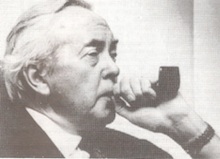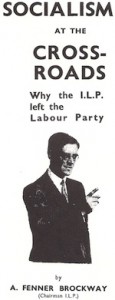Socialist historian IAN BULLOCK marks the ILP’s 130th anniversary by reflecting on its fateful decision to disaffiliate from Labour and his own relationship with the Party, drawing pointers for today’s left about the unhappy consequences of separation.
I will get onto the ILP and the Labour Party soon. But first I want to explain a bit about myself. Since the 1970s I’ve been researching and writing about the early socialist movement in Britain. My main inspiration at the start was a couple of sentences in Walter Kendall’s The Revolutionary Movement,1900-1920. I got to know Kendall very well and did a little work on his Voice of the Unions in the 1970s.
 He was primarily concerned with The Origins of British Communism, as the subtitle of his book makes clear. But it was a passage in the conclusion that caught my eye and set me off on an exploration that has continued ever since. I wanted to find out what went wrong: why was so little progress made towards the long-anticipated socialist commonwealth?
He was primarily concerned with The Origins of British Communism, as the subtitle of his book makes clear. But it was a passage in the conclusion that caught my eye and set me off on an exploration that has continued ever since. I wanted to find out what went wrong: why was so little progress made towards the long-anticipated socialist commonwealth?
It was the second sentence in this passage that triggered my interest: “The belief that the British Communist Party was in some sense a continuation of an earlier tradition fails to fit the facts. The revolutionary movement, before the transformation took place, had been ultra-democratic, opposed to leadership on principle, [and] opposed to the professionalisation of the Labour movement almost as an article of faith.”
The quote prompted me to research pre-1914 British socialism. I began a D Phil in 1975 and the results appeared some years later in Democratic Ideas and the British Labour Movement, 1880-1914, a joint work with Logie Barrow. His contribution centred on the ‘industrial’ side, while the ‘political’ part was largely based on my research.
At the end we concluded that there were signs of more authoritarian tendencies even before 1914. “Nevertheless, strong, radical notions of democracy were of major importance in the British socialist and Labour movements in the period preceding the Great War and the Russian Revolution.”
Most of what I’ve written since has explored aspects of this early British socialist movement until around 1924, the one exception being my 2017 book on the interwar ILP, Under Siege. I had reviewed Gidon Cohen’s Failure of a Dream for this website in 2010, which dealt with the fortunes of the ILP from disaffiliation to the war.
I was enthusiastic, but felt some aspects needed greater exploration. In particular, I thought the ILP’s post-disaffiliation story should really begin in 1918 with changes to the Labour Party’s constitution that allowed individual membership and introduced a branch structure. It radically altered the ILP’s position and potentially threatened its existence.
I also wanted to understand how the Labour Party could contemplate losing the ILP so calmly in 1932, especially so soon after the defection of Ramsay MacDonald and the disastrous 1931 election when the number of Labour MPs reduced from 287 in 1929 to 46.
In addition, I thought it significant that in its earliest years the ILP – compared especially with the Social Democratic Federation – had recruited far more women than other organisations, many of whom played important roles. Yet in its post-disaffiliation period, only three women were on the National Administrative Council (NAC), two of whom, Dorothy Jewson and Jennie Lee, lasted only until 1934 and 1935 respectively, leaving Kate Spurell as the sole female member.
Think twice
I am no expert on the 21st century Labour Party but I would caution anyone, whatever the provocation – and there have been plenty over the years – to think at least twice before leaving.
 I first joined Labour in 1964 and nowadays have a much more positive attitude to the post-’64 Wilson government than I did then. At least he kept us out of the Vietnam war, in contrast to Tony Blair and Iraq, and there was much else to commend it, most of which I failed to appreciate at the time. Indeed, I was so disgusted by the lack of radicalism in the party’s offer at the 1970 election that I didn’t renew my membership until Thatcher’s rise brought home the advantages even of a not-so-radical Labour government.
I first joined Labour in 1964 and nowadays have a much more positive attitude to the post-’64 Wilson government than I did then. At least he kept us out of the Vietnam war, in contrast to Tony Blair and Iraq, and there was much else to commend it, most of which I failed to appreciate at the time. Indeed, I was so disgusted by the lack of radicalism in the party’s offer at the 1970 election that I didn’t renew my membership until Thatcher’s rise brought home the advantages even of a not-so-radical Labour government.
When I left, I didn’t join any other party or group. The alternatives were virtually all based on some interpretation of Leninism, which had absolutely no attraction for me. Meanwhile, I continued to vote for Labour candidates, so the only practical result of my non-membership was that Labour didn’t get my subscription.
Had I known about them then, I might have drawn on the ILP’s experiences after it disaffiliated in 1932, in particular, the striking fact that by 1939 ILP membership had dwindled from around 17,000 to less than 3,000.
The ILP’s main complaint at the time was that Labour was committed only to ‘gradualism’ and ‘reformism’ – a tendency some detect in the current Labour leadership. There were a lot of ILPers who opposed disaffiliation, and many stayed with Labour, some forming the Socialist League. Those who remained with the ILP believed it should pursue a ‘revolutionary policy’. The problem was, they just couldn’t agree what that meant nor how to achieve it.
For one section – the largely London-based Revolutionary Policy Committee (RPC) – it meant co-operating with the Communist Party of Great Britain and working towards an eventual merger. For ILP secretary John Paton, however, it meant the exact opposite. For him the aim was to crush the totally undemocratic and politically useless Communist Party and establish the ILP as the revolutionary alternative to Labour.
On the other hand, the recently-recruited Middleton Murray wanted it to establish a correct interpretation of the works of Karl Marx, which in his view everyone else had got wrong.
For the RPC, progress towards co-operation with the CP was far too slow. Many supporters eventually left and joined the Communists. The opposite was true for many in the ILP’s large Lancashire division for whom any talk of a united front with the CP was anathema. Most of them left too, to form the Independent Socialist Party, which then pursued its own version of revolutionary democratic socialism until after the Second World War.
A breach too far
So disaffiliation to pursue a revolutionary policy turned out to be much more complicated than it first appeared in 1932. As David Howell pointed out more than 30 years ago in an essay in The ILP on Clydeside, whether they joined Labour after disaffiliation, such as Emrys Hughes, or stuck with the ILP, such as Fenner Brockway and Jennie Lee, all ex-ILPers “were insistent that the breach should not be repeated”.
 In fact, the decision was almost reversed a few years later. A special ILP conference was scheduled for 17 September 1939 to discuss a proposal from its national council to seek re-affiliation. Had war not broken out on 3 September that motion may well have won the day, although it would have faced much opposition. As it was, the conference was cancelled and the ILP remained outside Labour until the mid-1970s.
In fact, the decision was almost reversed a few years later. A special ILP conference was scheduled for 17 September 1939 to discuss a proposal from its national council to seek re-affiliation. Had war not broken out on 3 September that motion may well have won the day, although it would have faced much opposition. As it was, the conference was cancelled and the ILP remained outside Labour until the mid-1970s.
Some of the leading figures supporting disaffiliation – John Paton, Bob Edwards, and, perhaps above all, Fenner Brockway and Jennie Lee – later made valuable contributions as Labour politicians, in Brockway’s case doing so until he died aged 99. (I well remember, just a few years before, collecting him from a nearby Brighton pub to address a local meeting.)
My other lesson is drawn from the 1920s and can be summed up as, “be careful what you wish for – and who you support”. By the time of the second minority Labour government in 1929, the ILP had become a sort of ‘party within the party’, and the MacDonald-led government was constantly harried by the ILP under Maxton’s leadership.
Yet MacDonald had become Labour leader in 1922 partly with the ILP’s support, principally because he had opposed the First World War (although somewhat equivocally), while his opponent, JR Clynes, had served in the war-time coalition government. Macdonald won by just five votes, owing his success to Maxton and the ILP’s Clydeside MPs, and to ILP members more generally, who agreed to support him during a pre-vote meeting.
Of course, they soon became the most determined opponents of his leadership and the fiercest critics of his government’s lack of radicalism. I can only repeat what I wrote when I looked at ‘lessons from the interwar ILP’ in 2018 – would the ILP, or Labour generally, have done better with Clynes? Probably not, but who can say?
—-
Ian Bullock is a historian of the early socialist movement and Friend of the ILP. His website on socialism and democracy is here.
He wrote Democratic Ideas and the British Labour Movement, 1880-1914 (1996) with Logie Barrow.
He is author of Romancing the Revolution: The Myth of Soviet Democracy and the British Left (2011), Under Siege: The Independent Labour Party in Interwar Britain (2018), and The Drums of Armageddon (2021).



20 February 2023
In – unless and until we have PR, and even then we’d be in a coalition. We’re in a coalition now, under the Labour umbrella.
The history of parties to the left of Labour isn’t good. Far too much of the mentality of the ‘People’s Front of Judea’.